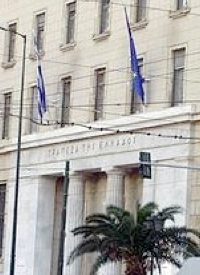
“The Greek debt situation is not going away,” observed Robert Zukowski, a senior analyst at 4Cast Limited in New York. His statement came after a one-day rally on Wall Street, which seemed to provide some hope of a rise in the investment market. It is not just the Greek debt situation that is troubling investors; it is concern about a “disorderly” default on Greek sovereign debt. The cost of simply insuring Greek sovereign debt has jumped an astounding 1500 basis points, making it the most expensive of this type of insurance in the world. Standard & Poor’s recently dropped its rating on Greek bonds to “CCC,” which is the lowest of all the 131 nations whose debt it rates.
The response of the Greek people cannot encourage debt holders, as protests are still erupting all across the country. Rioters are employing Molotov cocktails and police are retaliating with tear gas. Politicians — faced with clear choices about the need to (at the very least) reduce government expenditures — are bucking their Socialist Party leader. The Greek Finance Minister has just been sacked. Anger and entitlement — and little else — seem to motivate the people in this ancient country. More strikes are planned, especially in critical infrastructure industries such as transportation. Greek protesters have even attempted to keep deputies in the national legislature from going to their offices. Screams of “traitors!” and “thieves!” are also cast at politicians — in many cases, the very politicians elected by these protesters.
This situation in Greece can hardly give any reasonable person confidence, and the repercussions are being felt as this loss of confidence is affecting the euro. On Tuesday, the euro dropped to its lowest exchange ratio ever against the Swiss franc. Spanish government bonds are also paying interest at the highest level in 11 years. Both these statistics reveal how the Greek debt crisis is damaging the entire European Union. The sentiment within the EU that Greece must be saved from sovereign default is handwriting on the wall for investors.
Is all of this debt and turmoil creating good opportunities for American investors? Will the downturn in Greek, Spanish, Portuguese, and Irish government debt, along with European companies heavily invested in this debt, provide some bargains to buy? Randy Billhardt of MLV & Company in New York comments: “A lot of bad news has been priced into the market. People are taking that into consideration. On a long-term valuation basis there are some bargains out there.” Undeniably so: There are always bargains in investment markets, but these are also always relative bargains. Money seems to be used to acquire assets not dependent upon the whims of politicians and public-employee unions.
Increasingly, economists are warning that a Greek default will lead to a chain reaction. For instance, Jonathan Loynes, Chief European Economist at Capital Economics, explains:
It’s difficult to separate out the financial risks from the macroeconomic risks. The two are clearly related. If there are major systemic financial repercussions from some sort of Greek default then I think it would be pretty clear that there would be major macroeconomic effects.
Right now French and German banks own 55 percent of Europe’s exposure in Greek government debt. Rating agencies believe these banks could survive losses of 50 percent on these holdings, although bank stockholders would certainly suffer losses. Greek banks, however, hold a whopping one-third of Greek government debt. These banks could be swept away if there were a default, even a partial default. This fact is not helping Greek banks keep their stock values high. Compounding the problems Greece faces is the relatively unprofitable nature of business in the country caused by government-created business costs.
Could a chain reaction from Greek financial woes hit America? Certainly American investors and companies with Greek bonds or business holdings in Greece or Europe could be individually hurt by a default, and no sensible person should want a Greek default; however, providing some sort of global help for Greece would do nothing to address the country’s underlying problems. For one thing, pensions are too high, especially public-employee pensions. Politicians are using tax monies to buy votes. Fiscal conservatism has given way to “investment” (spending) and unrealistic borrowing. When the piper must be paid, the Greek people have been guided into resentment directed toward their politicians who are urging austerity, or toward the Germans (who are handling their money more cautiously).
The lesson for the American government should be clear: Public debt is extremely dangerous, which is why the U.S. federal government for much of its early history kept the national debt low and, indeed, almost paid it off about three decades after the Constitution was adopted. Borrowing should be an emergency stopgap, not an ordinary system for financing operations. If that is the lesson, then perhaps this is the danger in America: A globalist President who perceives our national security to be threatened in Libya may see our economic security endangered by a meltdown of Greece (or Portugal, Ireland, or Spain).
At one time, Americans would have seen the folly of other nations as a lesson to be learned. Constitutionalists hope a majority of them still do.
Photo: The entrance of the Bank of Greece.



